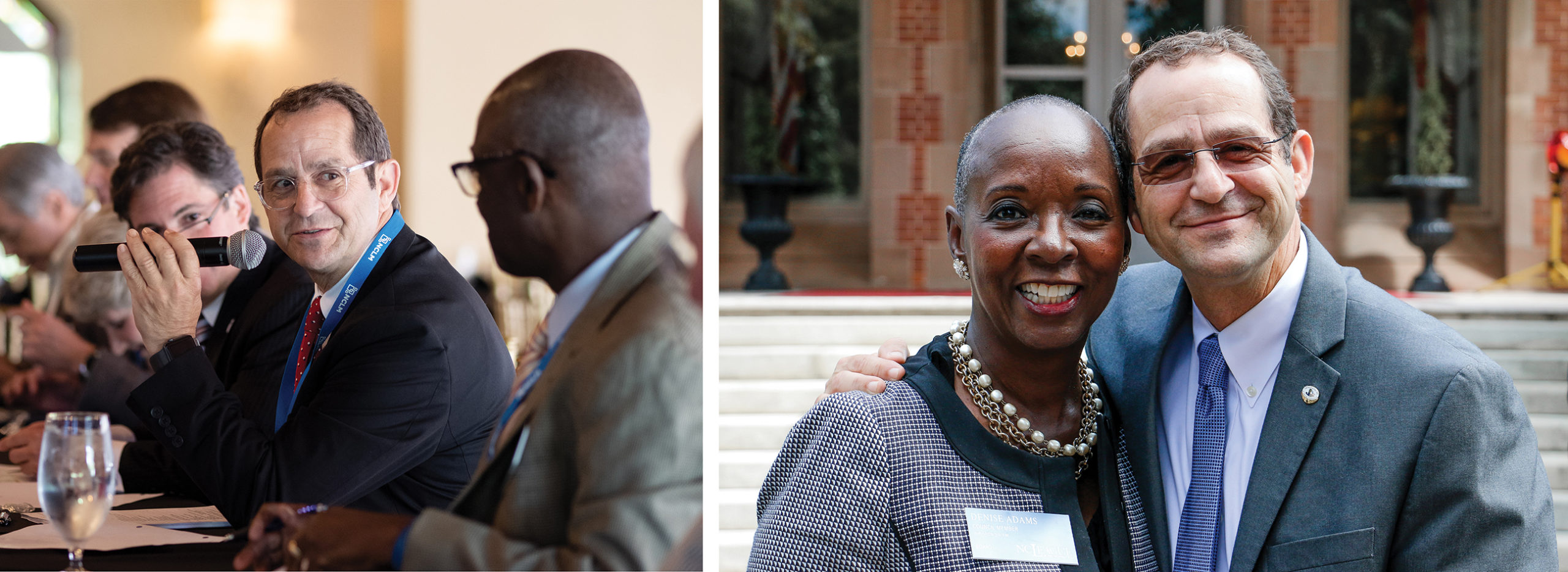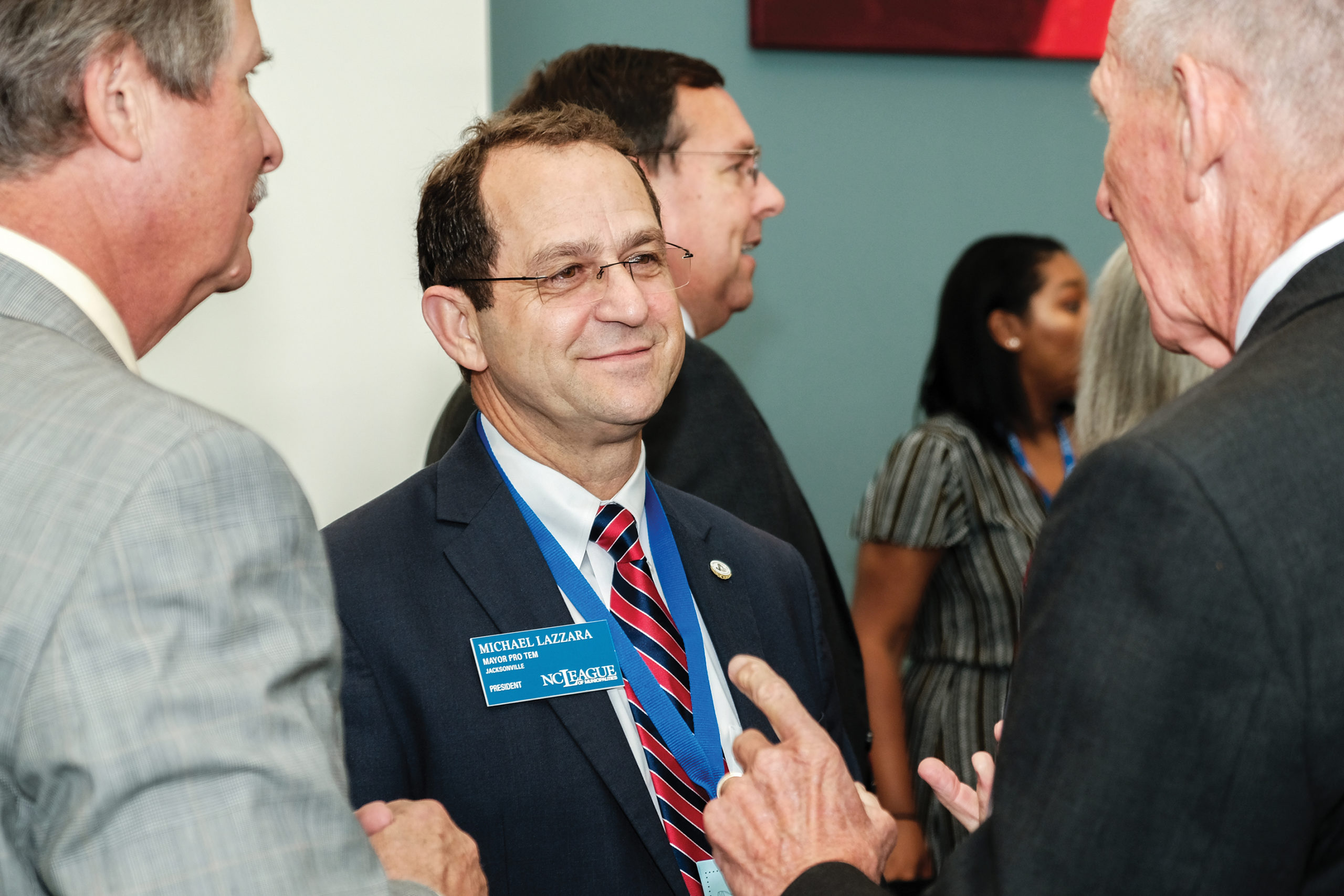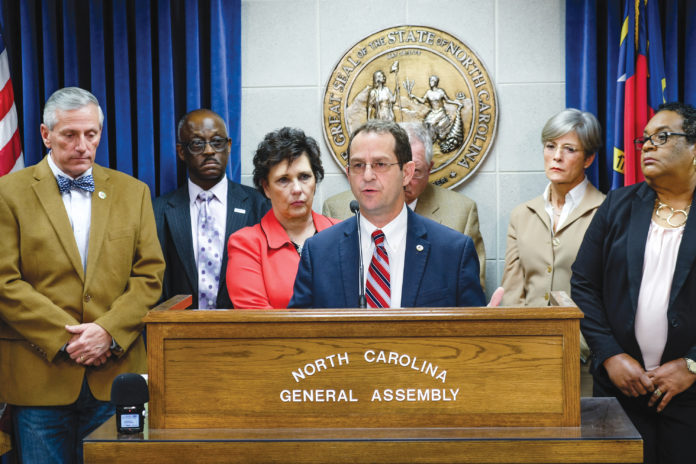The former Jacksonville Mayor Pro Tem and past League president on his freshman legislative service.
Michael Lazzara is one of the most familiar faces to the League in recent history. He served an extended term as League president while mayor pro tem of Jacksonville, emceed numerous events and conference sessions for gatherings of municipalities, oversaw various internal and external issues on the League’s board of directors, and spent valuable time with mayors, council members, and appointed municipal staffers to absorb just how diverse North Carolina’s array of cities and towns actually is. But, at the end of the day, mayors and other leaders embrace similar goals—good livelihoods, strong infrastructure, opportunities for growth, a pleasant quality of life, and so on for their fellow residents. It’s this experience that gives Lazzara, now Senator Lazzara, a special set of eyes as he navigates the General Assembly and how it crafts solutions for the people. Southern City was fortunate to catch up with him just prior to the Thanksgiving break.
˘˘˘
How has your experience as a municipal leader affected your experience as a state legislator?
ML: I think my prior experience, having been elected leader in local government, and actually my work and involvement with the League, has certainly made it an easier transition and a more productive transition. Because understanding local government and statewide issues as it relates to the issues and the people that we serve certainly gives you a different perspective when it comes to legislation and budget, of course.
Have there been occasions where you feel specifically that your municipal service has helped you to vet a bill or sift through language?
ML: Absolutely. There have been numerous bills, out of the 1,700 bills that were filed between the House and Senate, as it relates to regulatory issues, inspection issues, permitting issues, things that relate to local governments and having been there I think I’ve brought a valuable voice to concerns over particular language—and education: finding that balance between overreach and building sustainable communities that require zoning and laws that help maintain those valuable communities.
 Do you feel a greater presence of municipal experience in the legislature? There are some other past mayors and city officials serving as legislators.
Do you feel a greater presence of municipal experience in the legislature? There are some other past mayors and city officials serving as legislators.
ML: I think there is, and it seems to be gaining some traction as new members come in. There’s a great deal of value that comes from having that background, to truly understand how citizens are impacted by legislation that affects them directly, through local government. I think it’s important to know what that is and how they’re affected directly by a particular law change. A good example is the amount needed before you have to hire a general contractor on renovations, and I could go on and on, but again there’s two sides to every coin. You know, if you live in a coastal area where you’re susceptible to a lot of storms, a lot of out-of-town folks come in to take advantage of people. So, in that landscape, having that oversight is really important to protect the people that are homeowners. And maybe in the mid to west side of the state, you’re not as susceptible. Again, it’s really trying to find that balance … and making sure that we know how it impacts the actual people that we serve.
It occurs to me as you’re talking about this that the nonpartisan nature of municipal government may be a great way to become versed in talking policy with people on different issues without party being the focus.
ML: In the 15 years that I was in local government—we had Republicans and Democrats on council—but I don’t ever remember there being a partisan vote. When you talk about water and sewer infrastructure, recreation, it really is nonpartisan at the local level. But I think bringing that sort of negotiating attitude to the General Assembly certainly helps navigating with our counterparts there, and I think it’s helped tremendously in terms of getting along with the other side of the aisle and building relationships. Because, at the end of the day, we serve the same people—and generally people want the same things, whether you’re partisan or nonpartisan. A lot of the people that we serve want low taxes, they want good education, they want quality of life, they want a good business economy, they want all the basic things that I really truly believe are nonpartisan. Obviously, there are some partisan issues we deal with but, fundamentally, I think when you take the (nonpartisan) approach, you can find more common ground with each other than not, and I think that’s a valuable tool.
 Is there anything that surprised you when you got to the legislature?
Is there anything that surprised you when you got to the legislature?
ML: I think a good surprise has been the camaraderie between the caucus members and even those outside of the caucus has really been better than I would have expected. We work together, we work through obstacles to find solutions, the dialogue is really, really good. But really the willingness to help each other. Just recognize that you can call any of us and we work together on issues. You’re never alone. We do work together, and I think that’s really a strong suit of the caucus.
Remind us why you were interested in moving from local government to the legislature to begin with.
ML: I spent 15 years in local government, and during that time I was sort of a nerd. I like infrastructure, water and sewer advisory, transportation. I spent 12 years on transportation as a (local transportation body) chair. I just found policy work pretty much a passion of mine. And then of course when I had the opportunity to serve on the League and as the League president for several years, working with mayors across the state, I think that’s where I really grew my passion for policy work, and I was ready to do something a little different, and I think that when this opportunity came up I kind of felt like I was prepared for it, prepared for that next challenge. And to be able to offer the years of experience that I had in local government and really at the state level with the League, having worked with so many mayors across the state, from Franklin to Duck, and I think it’s just really valuable to know the different challenges that different cities have. You don’t live in a glass when you do that. But the basic challenges really are much the same.
Is this a communication goal of yours? What do you think the feather in your cap is going to be in terms of where you come from and why you’re in the legislature now?
ML: I think one asset that I have is being from a military community. We just enacted the exemption for military retirees and that’s going to be a huge economic driver for the state, being the fourth-largest military footprint in the country. Again, I think having the years of experience and having the passion for the basic infrastructure needs of most municipal governments and understanding those needs … I know what it takes to put in a mile of road … I just feel like having that experience as we navigate through legislation in committees … I can bring a wealth of knowledge to help navigate that. I think, as a freshman, I’ve been able to do that.
It certainly is a commitment. To be effective you’ve got to be willing to put the time and energy into educating yourself and making sure that you’re putting the time in to be an effective leader. It takes time and education. But again, we’re all there to serve the citizens of North Carolina and to make it a better place to live and do business and retire. And that’s the sort of landscape that we’re trying to achieve while serving local governments.
And the beauty of having the League experience I think … it’s important to understand the differences within the state, different local governments. Challenges that we have in Jacksonville are much different than the challenges in Charlotte or Duck. But similarly, the same. And to know those differences, to know that there’s 230 cities and towns that are under 5,000 in population and the challenges that they have, to understand how many cities and towns that are not able to meet budget requirements, and the challenges that they face and how we play a role in that, to know how many cities and towns have failing water and sewer infrastructure and being thought leaders on how we correct those issues. At the end of the day, whether we agree or disagree how they got there, the impact is on the citizens that we serve, and we have a responsibility to find solutions to these problems. And you wouldn’t know unless you served in the right areas.













